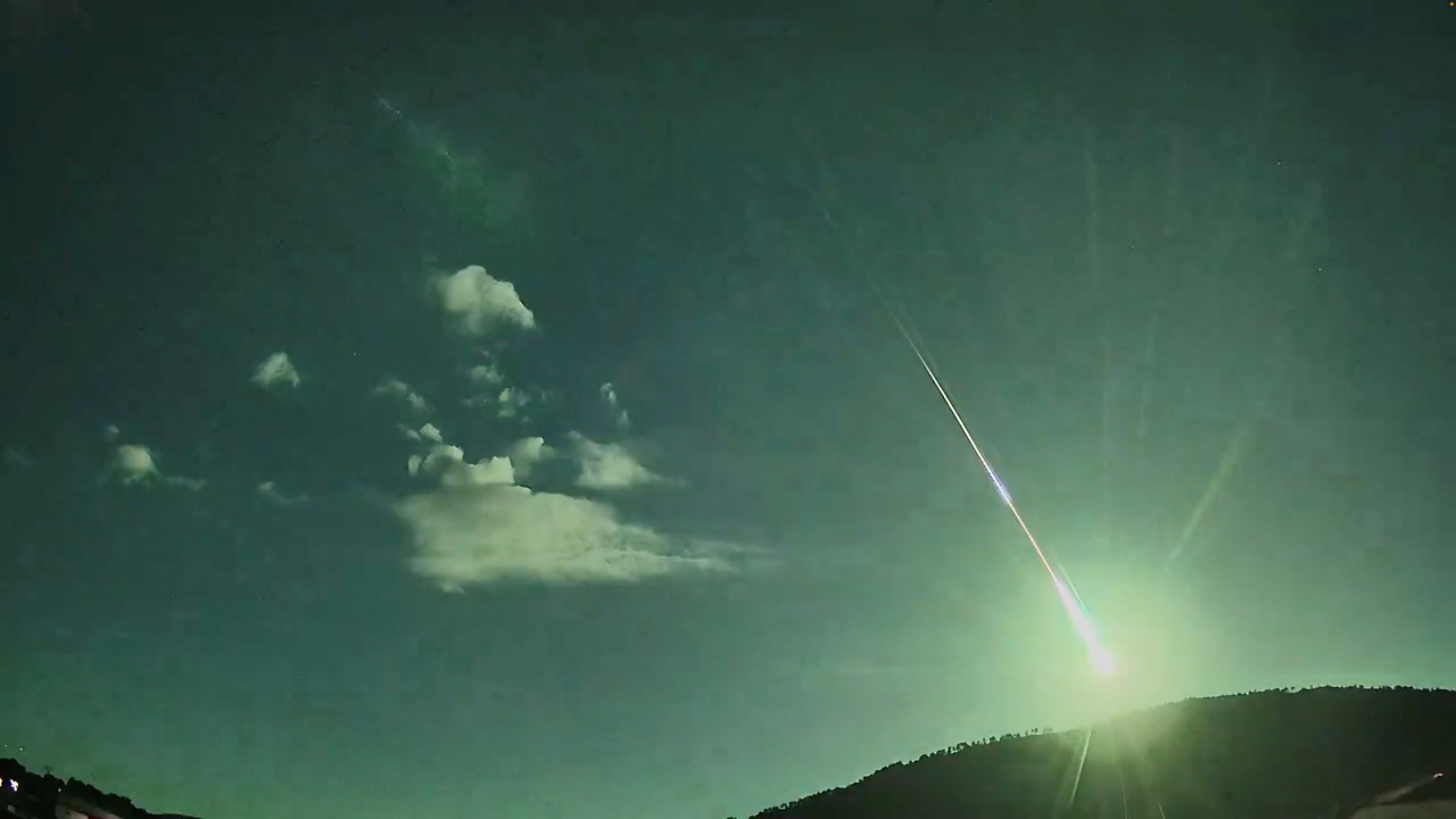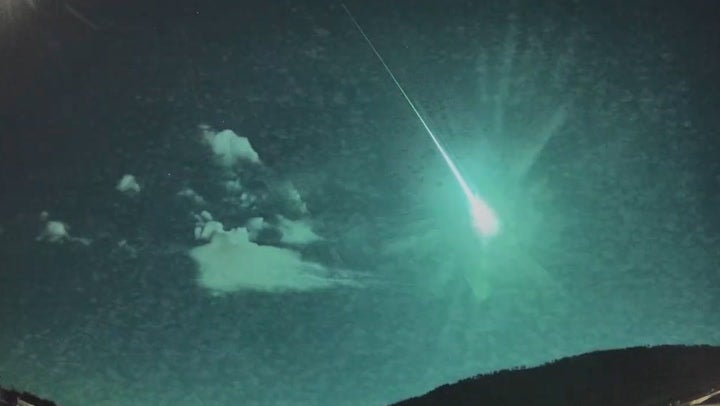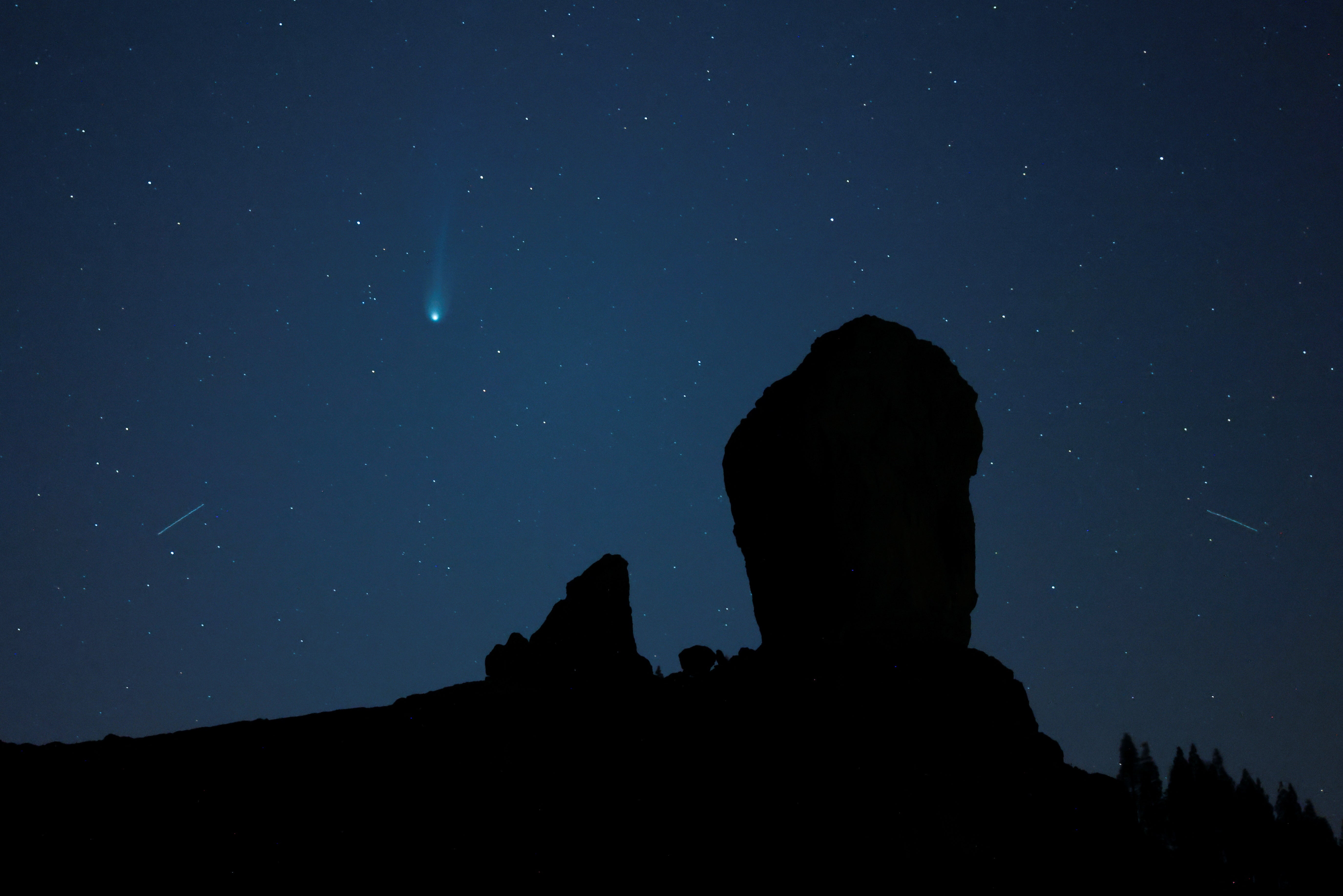Blue comet fragment lights up European skies - but will it happen again?
Videos show the comet named SPMN180524F passing over Extremadura, Madrid and Granada
Travelling at roughly 100,000 miles per hour, a chunk of ice and dust hurtled towards Earth as hundreds of people called police in a panic.
A comet, named SPMN180524F, illuminated the sky over Spain overnight Saturday in footage captured by the country’s scientific agency.
The videos from scientists at CSIC (Spanish National Research Council) shows the object passing over Extremadura, Madrid and Granada.
One video shows a girl accidentally capturing the stunning moment the sky flashes blue as she hangs out with friends.
She looks into the sky - her face in awe - and her friends shout ‘My God’ and ‘Merda’ loudly in Spanish as they recover from the once-in-a-lifetime astrological event.

Where did it land?
The agency said the blue light streaking across the sky over the western Spanish city of Caceres was a “stunning meteor” travelling at roughly 28 miles per second.
But it later said it appeared to be a “small piece of a comet” and not a meteor, estimating it flew over Spain and Portugal at a speed of 45 km (28 miles) per second before burning up over the Atlantic Ocean.
“The likelihood of any meteorites being found is very low,” the ESA said.
Travelling at roughly 100,000 miles per hour, the chunk of ice and dust caught fire as it broke apart in the atmosphere at a height of 76 miles above the ground before burning out once it reached an altitude of 54 kilometres (36 miles).
Initial reports suggested that the projectile touched down in the town of Castro Daire in central Portugal, although the ESA says it is highly unlikely that any meteorites actually made it to the ground.

Where did it fly over?
The Spanish Calar Alto astronomical observatory also said a preliminary analysis by Andalusia’s Institute of Astrophysics revealed the object had a “cometary origin”.
During a concert in the Portuguese city of Barcelos, the object was filmed streaking across the sky as the singer performed. Another video showed the skies of Porto, Portugal’s second-biggest city, turning bright for a few seconds.
Many contacted emergency services to report what happened. A spokesperson for the Spanish Emergency service 112, in Madrid, told Europa Press news agency it had received several calls.
It flew over Portugal at exactly 11.46pm.
Lisbon resident Bernardo Taborda, 31, told Reuters he was walking around the city with friends when the sky suddenly turned bright green: “It almost looked like daylight ... we all looked back and saw it.”
“It felt like a movie, we all looked at each other and we were stunned,” he added. “It was amazing.”

What do scientists say?
“It seems this was a cometary particle. The entry speed was between 44 and 45 [kilometres per second, 27-28 miles per second]. It overflew Spain and Portugal and then burned up at around 60 kilometres [37 miles] of altitude above the Atlantic,” head of the planetary defence office at ESA, Richard Moissl, told IFLScience.
“For sure, not a meteorite.”
“It’s an unexpected interplanetary fireworks show,” said Meg Schwamb, a planetary astronomer at Queen’s University Belfast.
Will it happen again tonight?
Unlikely but not impossible. It is not rare for comets to create shooting stars.
“We have notable meteor showers throughout the year, which are the result of the Earth crossing debris clouds of specific comets,” Dr Schwamb said.
This one is just closer to Earth and the “chunk is likely a bit bigger than a good fraction of the meteors we see during meteor showers, so this just made a bigger light show”.
Are meteor showers dangerous?
Scientists are concerned that chunks of ice and space dust larger than Saturday’s missile could again escape detection and smash into an unaware populated area.
10 years ago, on the morning of 15 February, 2013, a huge 20-metre rock crashed into Earth’s atmosphere, travelling more than 18 kilometres a second. It exploded over Chelyabinsk – the Russian city that would give the meteor its name – in a blast that was brighter than the Sun and shook with the energy of more than 30 atomic bombs.
Within minutes, the meteor’s explosion had shaken the ground, with around 1,500 people injured from broken glass and other damage, and left buildings damaged. It was the only meteor ever known to injure humans.
Join our commenting forum
Join thought-provoking conversations, follow other Independent readers and see their replies
Comments
Bookmark popover
Removed from bookmarks